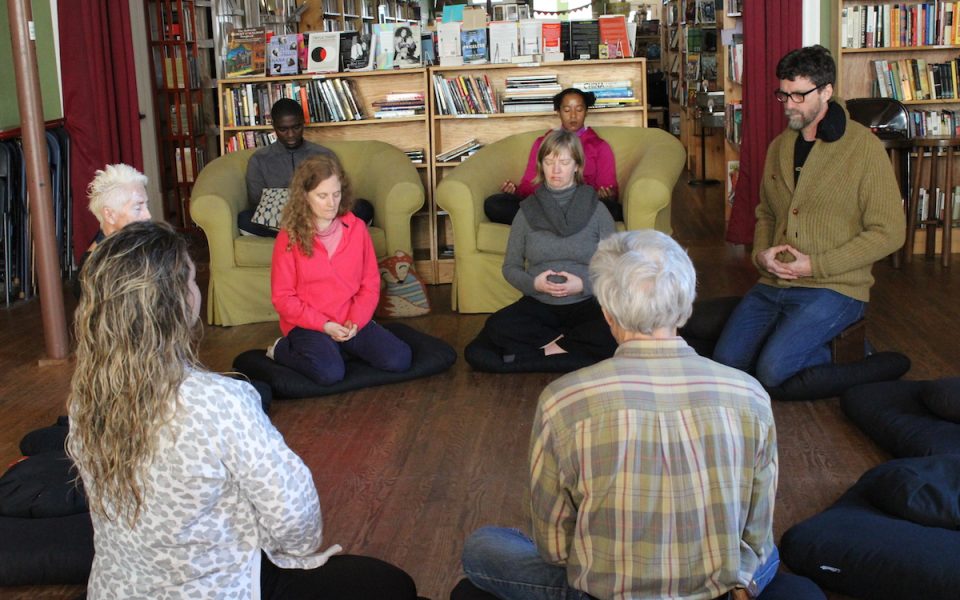It’s quiet, a little too quiet.
The continuous exhales of heat from the ceiling vents create
the only sounds in the back space at Scuppernong Books. On the floor, arranged
in a circle, lay about a dozen black pillows where men and women, young and
old, sit, their legs crossed and eyes nearly closed. Surrounding them, others
sit still in chairs, also in silence, the expressions on their faces unmoving,
their bodies calm and motionless, their only movement the slight rising and
falling of their chests as they breathe in and out.
The Gate City Zen Meditation Group has been meeting once a
week for the past decade. Every Sunday, they file into the used-books area in
the back of the indie bookshop in downtown Greensboro to meditate. Shoes,
jackets and purses lay in random piles outside of the space, delineating the
area beyond the curtains as a space of tranquility removed from the rest of the
cacophonous world.
“It’s about riding the thin line between thoughts,
sensations and emotion,” says co-founder Denise Gabriel, who has been
practicing meditation since 1983.
When she first moved to the city in 2009, she established a
sitting group in the house she was renting on Mendenhall Street. When
Scuppernong opened a few years later, she, along with Sarah and Gregory Krive,
moved the gatherings into the bookstore.

The group’s practice is grounded in a branch of meditation
called Zen meditation, or zazen, which literally translates to seated
meditation. Drawing from the Zen Buddhist tradition, the practice involves
being seated, with a focus on posture, says Sarah Krive.
“You want to make your body a three-pointed stool,” she
explains. “You sit with a natural curve of your spine and you keep your eyes
open with a soft gaze on the floor.”
Practitioners’ hands are folded and rest lightly in front of
their bellies in what Krive calls a mudra gesture; then they just sit.
“You’re not supposed to stop your thoughts,” says Gregory Krive. “You’re supposed to watch them wash up and don’t judge them. Kind of like watching waves wash up on a beach.”
Gregory, who has been practicing on and off since he was a
child, says meditation appeals to many people during times of transition.
“They come when something in their life is causing them
pain,” he says. “Whether it’s divorce or some type of glitch in their career.”
In decades past, churches would have been the place many would
go in times of need, but Gregory says that these days, the population of people
who consider themselves spiritual but not religious is growing. And that’s
where meditation fits in.
“It can be very healing to sit in sangha or community,” says
Sarah, who began practicing meditation in 2000. She was at a time in her life
where she felt anxious in her career as a teacher.
“I could talk about fear and anxiety and [the teacher] just
held it,” says Sarah, who now teaches at UNCG. “I felt supported.”
Sarah explains that she sees how anxious her students are,
especially her students of color and those who identify as LGBTQ+, and wishes
there were more meditation resources available to them on campus. Gregory, also
a professor at UNCG, says some of students’ anxieties may stem from increasing
student debt and the cost of higher education.
Their group is open to all individuals regardless of
experience or religious background.
On a recent Sunday morning, about a dozen people congregate
at their weekly meeting. Most tend to be older than college kids, but Gregory
says that attendance shifts due to the fluid nature of the practice. Like
physical or even talk therapy, meditation can be a temporary tool for those
facing hardship at a particular time in their lives, and once they overcome
their obstacles, they may stop coming for a while. Others make meditation a
constant practice.
“I had tried it on my own, but I couldn’t get into it,” says
Linda Hensley, who has been attending the meditation circle for five years. “But
in this group, 30 minutes feels like five minutes. You can feel the depth of
relaxation and spirituality.”

Hensley says she initially decided to try meditation after
her husband passed away and she was searching for comfort in community. When
her husband was alive, she had attended a Christian church but after his
passing, she said she didn’t feel like a part of the church.
“For me personally, I find that being in a group helps more
than being by myself,” she says. “It’s therapeutic in terms of life. It gives
me a sense of well-being.”
As the members of the group sit peacefully in the back of
the bookstore, the streets outside begin to bustle with activity. Cars drive
past and couples and families walk to and fro on the sidewalks, ready to enter
shops and start crossing items off of Christmas lists. It’s a hectic time of
year, but within these walls, time seems to stand still.
“You get a break from being human for an hour,” Gregory
says.
Learn more about the Gate City Zen Meditation Group on Facebook. They meet weekly at Scuppernong Books in Greensboro on Sundays at 9 a.m.
Join the First Amendment Society, a membership that goes directly to funding TCB‘s newsroom.
We believe that reporting can save the world.
The TCB First Amendment Society recognizes the vital role of a free, unfettered press with a bundling of local experiences designed to build community, and unique engagements with our newsroom that will help you understand, and shape, local journalism’s critical role in uplifting the people in our cities.
All revenue goes directly into the newsroom as reporters’ salaries and freelance commissions.


Leave a Reply